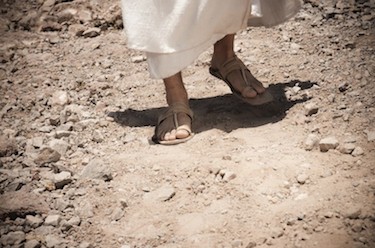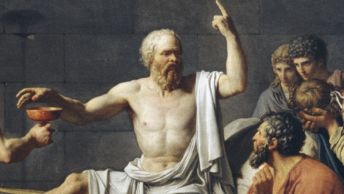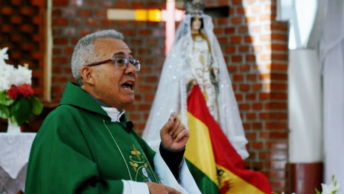 One Saturday night a man named Richard received the kind of phone call every parent dreads; he was told, “Your son Paul is in the hospital; you had better come right away.” He raced to the hospital and discovered that his twenty-year-old son had apparently been mugged and severely beaten; as Richard later explained, “Paul’s eyes were swollen and bleeding. . . . He had multiple contusions. X-rays showed a skull fracture and a possible fractured nose and orbital bone. The doctors suspected brain damage; he was a mess.” Paul was unable to speak and tell the police what had happened or who had assaulted him. As Richard drove home, he was infuriated, and began fantasizing how he would track down and punish the thugs who had done this. His wife and the other children were devastated; they visited Paul and prayed for him, but Richard didn’t have time for prayer; he began planning the steps he would take: buying a gun, putting up wanted posters near the site of the crime, walking the streets and paying for information, and so on.
One Saturday night a man named Richard received the kind of phone call every parent dreads; he was told, “Your son Paul is in the hospital; you had better come right away.” He raced to the hospital and discovered that his twenty-year-old son had apparently been mugged and severely beaten; as Richard later explained, “Paul’s eyes were swollen and bleeding. . . . He had multiple contusions. X-rays showed a skull fracture and a possible fractured nose and orbital bone. The doctors suspected brain damage; he was a mess.” Paul was unable to speak and tell the police what had happened or who had assaulted him. As Richard drove home, he was infuriated, and began fantasizing how he would track down and punish the thugs who had done this. His wife and the other children were devastated; they visited Paul and prayed for him, but Richard didn’t have time for prayer; he began planning the steps he would take: buying a gun, putting up wanted posters near the site of the crime, walking the streets and paying for information, and so on.
Sunday morning Richard went to Mass, but instead of paying attention, he kept thinking about his mission: find the criminals, inflict as much pain on them as possible, and make them pay. Slowly he realized the priest was reading the Gospel (Mt 5:17-37) we just heard, and he almost said aloud, “Not today!”—for a message on forgiveness was the last thing he wanted to hear. However, he could not ignore Our Lord’s words, “If you bring your gift to the altar, and there recall that your brother has anything against you, leave your gift at the altar, go first and be reconciled with your brother, and then come and offer your gift.” These words set off an inner struggle in Richard’s heart: surely God didn’t mean him, certainly not now in this situation! Those thugs needed to be punished, not forgiven! And yet, somehow Richard knew that unless he forgave them, his own wounded heart would never be healed—plus getting arrested for taking vengeance wouldn’t do any good for Paul or for the rest of the family. Richard slowly bowed his head and prayed silently, “God, help me. I don’t want to forgive them—but if You’re asking me to, I will.” He didn’t feel any better as he left Mass and drove to the hospital. Upon seeing him step out of the elevator, a nurse hurried over and started to say, “We didn’t know how to reach you. It’s about Paul . . . ,” but before she could finish, Richard—fearing the worst—ran to his son’s room. To his amazement, he saw Paul sitting up in bed, his face looking almost perfect—no contusions, no swelling of the eyes, no bruises or anything else. Another nurse told him, “The skull fracture isn’t showing up on Paul’s X-ray; he seems to be fine, and so we’re sending him home tomorrow.”
None of the doctors or medical staff at the hospital could explain how a severely-beaten and badly-injured young man could be miraculously made whole in less than a day—but Richard knew the healing was somehow linked to his willingness to forgive (Joan Anderson, Where Miracles Happen, pp. 170-173). This true story offers us a vitally important reminder: following Jesus and taking His call to discipleship seriously requires us to rise above the standards of this world—for only by living according to the values of Heaven can we experience the fullness of God’s Fatherly care here and now on earth.
In his Letter to the Corinthians (1 Cor 2:6-10), St. Paul refers to God’s wisdom, a wisdom which is mysterious and hidden, quite different from the so-called wisdom of this world. Jesus tells us very clearly in the Gospel (Mt 5:17-37) just what this wisdom is: not only a willingness on our part to forgive and be reconciled, but also a sincere striving for holiness in all our actions, our words, and also our thoughts. Outward signs are not enough for God; He wants our wholehearted commitment. This, of course, is a difficult and challenging standard by which to live—but the Book of Sirach (15:15-20) assures us, “If you choose, you can keep the commandments, [and] they will save you.” Each one of us must decide between life and death, between love and hatred, and between good and evil—and whatever we choose will be deepened, multiplied, and given to us as our eternal destiny. God sees everything—including the working of our hearts—and so must strive to please Him in all our thoughts, words, and deeds.
Our world preaches vengeance and getting even; Jesus calls us to forgive, even as human justice takes its course. Our world promotes licentiousness and self-indulgence; Jesus challenges us to be pure, not only in our actions, but also in our thoughts. Our world makes use of misleading and evasive language and contracts with loopholes; Jesus counsels us to be simple, honest, and direct in our speech and in our dealings with others. Our Lord’s agenda is so radical and other-worldly that if enough Christians actually started living by it in a completely wholehearted manner, our society would be changed for the better almost overnight. Sinners would be converted, churches would be filled, and solutions to our society’s most vexing problems would be discovered. You and I may not have the power to bring about this sort of wonderful societal transformation, but we are expected to make a difference in our own circle of influence, proclaiming the powerful beauty of the Gospel through our example. Sometimes this will be easy; many times it will be hard—but as Richard discovered after painfully yet sincerely trying to forgive his son’s attackers, such an effort always unlocks God’s blessings and grace.
Without honesty, there is no personal peace or self-respect; without purity, there is no authentic human growth or development, and without forgiveness, there is no hope—either in this life or in the next. The false values of this world are illusions that lead us down the path of self-destruction; the values of the Kingdom—especially when they’re hard to implement—lead us to eternal life. Having to decide whether or not to forgive the thugs who beat his son was perhaps the most important moment and decision of Richard’s life; by making the right choice, he allowed God’s merciful love to change everything for the better. If and when we experience a similar moment of decision, we too must choose to live out our faith as true followers of Jesus—and regardless of the price we may have to pay, this is a choice we will never regret.








